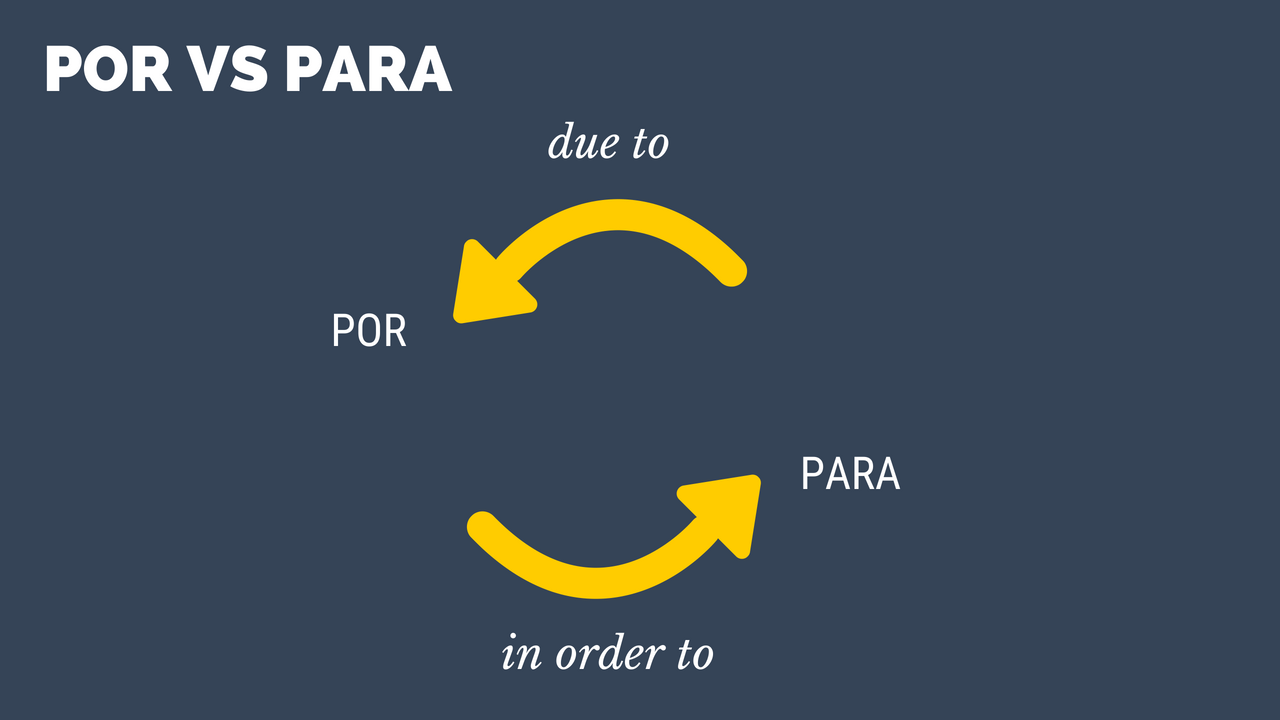Imagine if you could learn one simple rule that would dramatically improve your use of por vs para.
This would make your Spanish sound much more natural when it comes to using these two common prepositions in your Spanish conversations.
While there are 27 uses of por and 10 uses of para listed in the Real Academia Española dictionary, there is one rule that will significantly reduce the need to learn all of these different uses individually.
In this post, you’ll learn 12 must-know uses of por and para plus an essential hack that will significantly improve your use of por vs para when you can’t remember one of these 12 specific uses.
Por vs para: A quick reference
For your reference, in this section, you’ll find a list of shortcut links that will take you to the relevant sections of the post below.
But, the first thing you should read is the essential hack for por and para in the next section.
In this table, you can see a summary of all the main uses of por vs para with links to examples and explanations below.
| # | Por | # | Para |
|---|---|---|---|
| 1 | Cause | 1 | Purpose |
| 2 | Through, By or Along | 2 | Destination |
| 3 | On behalf of | 3 | Opinion |
| 4 | By a medium | 4 | Outcome |
| 5 | During a time of day | 5 | Recipient |
| 6 | Price or exchange | ||
| 7 | To say thanks or sorry |
Por vs para: An essential hack
If you consider por and para in English, they could mean: for, by, through, in, during, across, towards, instead of, on behalf of, etc.
In addition, as I mentioned earlier, the Real Academia Española dictionary lists 27 uses of por here and 10 uses of para here.
But, there is a simpler way to think about these prepositions. And similar to a decision-making model I provided recently on guessing the uses of ser and estar, there is a decision model (or hack) you can use to guess which preposition (por or para) is right for a given situation.
Of course, the decision model won’t work in every possible scenario. But, it will help a lot!
The idea is, instead of thinking of ‘por’ to mean ‘for’ and para to mean ‘for’, think of these two definitions:
por → due to
para → in order to
This graph also highlights the idea further by showing that ‘due to’ could refer to motivation from the past and ‘in order to’ could refer to a goal for the future:

Let’s look at a simple example to see how this hack works.
Imagine you are going to university to study medicine and someone asks you:
Why are you studying medicine?
To demonstrate the hack, consider these two possible answers:
- Your parents wanted to you to study medicine
- You really want to become a doctor
If you want to give the first answer, you need to say you are studying medicine ‘due to’ the pressure applied by your parents. You could then answer the question as follows:
English: I’m studying medicine for my parents (due to my parents).
Español: Estudio medicina por mis padres.
To give the second answer, if you want to say you are studying medicine ‘in order to’ become a doctor, you can say:
English: I’m studying medicine in order to be a doctor.
Español: Estudio medicina para ser médico.
In addition, to help you think about this idea in one more step, you can also consider a third situation:
3. You have always wanted to be a doctor
Now, should you use por or para? Are you studing ‘due to’ the desire or ‘in order to’ the desire?
In this third scenario, you are now referring to a motivation from your past (similar to the parent’s motivation from the past), so you should go with ‘due to’ and por:
English: I’m studying medicine due to my desire to be a doctor.
Español: Estudio medicina por mi deseo de ser médico.
Furthermore, you can also consider how to ask the original question in Spanish to get these answers:
English: Why are you studying medicine? (what is the motivation)
Español: ¿Por qué estudias medicina?
English: What are you studying medicine for? (what is the outcome or purpose)
Español: ¿Para qué estudias medicina?
Whenever you can’t remember the uses of por and para, and need to make a guess, think about whether the idea you need to express is about a motivation from the past or an outcome for the future.
Is the idea more like a cause such as ‘due to my parents’ or more like an outcome such as ‘to be a doctor’?
Now with this simple hack in mind, let’s look at the individual uses of por and para in more detail.
Por – Use 1 – Cause
The first use of por is for talking about the cause of something. You can think about the translation of the English phrases ‘due to’ or ‘owing to’.
English: The office is closed for vacation.
Español: La oficina está cerrada por vacaciones.

English: We arrived two hours late due to traffic.
Español: Llegamos dos horas más tarde por el tráfico.
English: They cancelled the concert due to the rain.
Español: Se suspendió el concierto por la lluvia.
Por – Use 2 – Through, by or along
This next use of por occurs with movement. You will often see this use of por alongside verbs of movement such as ‘going’, ‘walking’ or ‘entering’.
English: Let’s go through the park.
Español: Vamos a pasar por el parque.
English: You have to enter through there.
Español: Tienes que entrar por allí.
English: I run along the river every day.
Español: Corro por el río todos los días.

Por – Use 3 – On behalf of
When you need to talk about someone doing something in the place of someone else, or on behalf or a country or organisation, you need to use por.
English: I can’t speak on behalf of my friends.
Español: No puedo hablar por mis amigos.
English: Marco can’t work today. I’m working for (on behalf of) him.
Español: Marco no puede trabajar hoy. Trabajo por él.
English: He died for (on behalf of) his country.
Español: El murió por su país.
Por – Use 4 – By a medium
For this use of por, think about the transmission of anything but people. Often the translation of ‘by’ or ‘via’, you can use por here to express sending messages, packages, or ideas.
English: I’m speaking on the phone with my mum.
Español: Estoy hablando por teléfono con mi madre.
English: Lara sent me my results via email.
Español: Lara me ha enviado mis resultados por correo electrónico.
English: He sent the package by plane.
Español: Él envió el paquete por avión.
Before moving on, typically when you are talking about things they go por avión (by plane) or por coche (by car). But, when you are talking about people they go en avión (in a plane) or en coche (in a car).
If you want to learn more about prepositions of movement check out this podcast episode.
Por – Use 5 – During a time of day
This use of por is for simple phrases about the time of day. Think of this use as the best translation of ‘during’, such as ‘during the evening’.
English: I don’t like to work during the mornings.
Español: No me gusta trabajar por la mañana.
English: You have see the city at night. It’s incredible.
Español: Tienes que ver la ciudad por la noche. Es increíble.
English: I prefer to go out at night on Fridays.
Español: Yo prefiero salir por la noche de los viernes.
Por – Use 6 – Price or exchange
In English, you might say ‘I want to exchange this for that’, in Spanish you would use por to say ‘for’ in this context.
English: I bought it for 12 euros.
Español: Lo compré por 12 euros.
English: She gave me 15 dollars in exchange for the lamp.
Español: Ella me dio 15 dólares por la lámpara.
English: I love your purse. Are you interested in exchanging it for my jacket?
Español: Me encanta tu bolso. ¿Te interesa cambiarlo por mi chaqueta?
Por – Use 7 – To say thanks or sorry
Whenever you want to say ‘thanks for’ or ‘sorry for’, you must use por.
English: Thanks for listening (to me).
Español: Gracias por escucharme.
English: Thanks for inviting me.
Español: Gracias por invitarme a venir.
English: Sorry for what I said.
Español: Lo siento por lo que he dicho.
Para – Use 1 – Purpose
The first use of para is for talking about the ‘purpose’ of an item, or in other words, it’s intended use.
English: This music is for relaxing. (This music is made in order to relax).
Español: Esta música es para relajarse.
English: This soil is good for the plants.
Español: Este suelo es bueno para las plantas.
English: This water is not for drinking.
Español: Esta agua no es para beber.
Para – Use 2 – Destination
The next use of para is for talking about a final physical destination.
English: In 10 minutes, we’re leaving for home.
Español: En 10 minutos, nos vamos para casa.
English: My brother just left for Spain.
Español: Mi hermano acaba de salir para España.
English: I’m going towards there (I’m on my way to you).
Español: Voy para allá.
Para – Use 3 – Opinion
When you want to offer your opinion or ask the opinion of others, you can use para as follows:
English: For me, it’s very interesting.
Español: Para mí, es muy interesante.
English: For us, the life here is unbearable.
Español: Para nosotros, la vida aquí es insoportable.
English: In a relationship, for me that which is most important is the ability to compromise.
Español: En una relación, para mí lo mas importante es la capacidad de llegar a un acuerdo.
Para – Use 4 – Outcome
This fourth use of para is the best translation of ‘in order to…’.
English: I’m studying in order to become a doctor.
Español: Estoy estudiando para ser médico.
English: In order to make a good paella, it’s necessary to start with the best ingredients.
Español: Para hacer una buena paella, es necesario empezar con los mejores ingredientes.
English: In order to be in shape (fit), the most important thing to do is to think about diet.
Español: Para estar en forma, lo más importante hacer es pensar en la dieta.
Para – Use 5 – Recipient
If you want to describe who something is for, such as a present or food, use para followed by the description of the recipient.
English: The gift is for my dad.
Español: El regalo es para mi padre.

English: This money is for you.
Español: Este dinero es para ti.
English: The salad is for me and the gazpacho is for her.
Español: La ensalada es para mí y el gazpacho es para ella.
English: I have been working for my boss for 3 years.
Español: Llevo 3 años trabajando para mi jefe.
In this last example, you could replace ‘jefe‘ (boss) with ‘la empresa‘ (the business), or a name of a company: Google, Apple, El País etc.
Your Turn
I hope you enjoyed this article on por vs para.
Now I want to hear from you:
Which use of por and para from this post are you most excited to try out?
Are you going to use por to talk about motivations? Or do you want to use para to talk about an outcome?
Please let me know by leaving a quick comment.




Remember that of the two, only “para” is truly rule-driven. The rule is, “para” points to a future endpoint of some sort. There are two exceptions, “opinion” and “comparison with the norm.” Otherwise, “para” points to some future end: El regalo es para mi madre (it’s destined for her); Caminamos para el río (that’s where we’re headed”, Estudio para sacar buenas notas (good grades are the future outcome, hopefully, anyway), etc. The one REALLY confusing use of “por” in this rule-driven scheme is motive with verbs of motion, like, “Fui a la tienda por café” (it helps to remind the students of the “going by”: the store isn’t the end goal, it’s a waypoint on the way to a good cup of café PARA estar más alerto 😉 That one draws the ire of many a student, but it’s not a bad trade off, because the get an actual rule to hold on to, not just a series of different functionalities.
Hola Alex, thank you for your contribution!
Hey Andrew, love the series so far and these articles really help. I am beginner/intermediate but still get these confused so I am writing a study guide using my own examples and I got caught about the sentence “I work for him” like a employee-boss relationship. Would this be on behalf of him, por, or is he the recipient of my work, para?
Hola Michael, great question!! Firstly, think about the example with Marco above in use #3 of ‘por’. He can’t work today so I’m working ‘on behalf of’ him, or ‘instead of’ him, in this case you need to use ‘por’. In contrast, if you are regularly working for a boss, you can think about use #5 of ‘para’ because the boss is the ongoing recipient of your work. In fact, I’ll add another example of use #5 for clarity. (I have been working for my boss for 3 years).
Thanks!
¡De nada! 🙂
I like your way of dealing with those nuances of language. I can by brute force and many questions on the part of the Spanish speaking person listening to me, get to a place of understanding, and this helps me more completely understand these differences concerning Por and Para.
I have some familiarity with other languages and it always brings a smile from me when someone wants to learn a language quickly. I am older than dirt and even now after decades of speaking my native language; I am still learning. No one ever “arrives” it is a journey and I don’t discourage new people with this and allow them to arrive at the fact that “completely” and “quickly” learning a language is just a pipe dream.
However, your way of teaching is very good at sorting out all these vulgarities of Spanish.
Gracias,
miguelito ratoncito
¡Thanks Miguelito! 🙂
¡Hola Andrew! Espero que esté bien. Me gusta añadir algunas cosas en la discusión sobre las preposiciones “Por” y “Para”. Primero de todo, la preposición “por” no sólo es usado para ‘lo siento’ o ‘gracias’, sino que se utiliza para expresar todos los tipos de emociones como ‘feliz’, ‘celoso’ etcétera. Segundo, ha explicado que cuando movimiento de cosa, ‘por’ es usado . Por ejemplo : ‘Lara me ha enviado mis resultados por correo electrónico’. En caso de gente utilizando transportación, en lugar de ‘por’, la preposición ‘en’ es usado. Pero he visto que en caso de la gente utilizando la transportación, ‘por’ es usado. Por ejemplo : “Viajamos por tren a Italia.” Sin embargo, gracias por la discusión en el capítulo muy importante en español maravillosamente. ¡Saludos! Tapan.
Hola Tapan, gracias por tu comentario. You’re right, when we talk about people being transported by modes of transport, we should use “en”, and when we talk about things, we should use “por”. For your example, I would say you have a two options depending on what you want to say:
“We travel through Italy by train” – “Viajamos por Italia en tren”
“We travel to Italy by train” – “Viajamos a Italia en tren”
I have seen a few examples of sentences using para to describe a period of time. For example: “La reserva del hotel es para una semana.” However, it has also been explained to me that this is not appropriate for all periods of time. For example: “Estuve en México durante un mes.” — not “para un mes.” Can you explain how this fits into what you have described in this article?
This is a great question. “Para” is used for deadlines, so when we say “La reserva del hotel es para una semana”, this doesn’t mean that the reservation is for the duration of a week, it means that the reservation is set to start in a week from now. A possible translation to English for this sentence could be “the reservation is made for a week from now”. I always recommend that students default to “durante” when talking about time durations because it is simple, it works every time, and it doesn’t result in a choice between “por” and “para”.
Really helpful – am just starting out with Spanish and want to try to crack this!
Thanks for the feedback Kate! Try to focus on one or two uses at a time instead of trying to learn them all in one go.
Muchas Gracias por esta lección.
Para mi, es muy útil.
Especialmente los eruditos comments.
Gracias Don, me alegro 🙂
I appreciate this thorough discussion of the topic and find it very useful. I am working with a couple of newer language learners on this concept and I was particularly interested in the table you created, and in the example about becoming a doctor. The third scenario you present in that example might benefit from a bit of clarification when equating “por” with motivation.
Consider:
¿Por qué estudias medicina?
Estudio medicina para poder ayudar a la gente.
This is clearly covered by the “in order to” concept (“purpose” or “outcome” in the table) but a newer speaker might be confused because it conceptually deals with motivation.
Thanks for the thoughtful discussion and explanation.
Hola Lynell, yes, you’re right!! Motivation could be “por” or “para” and that’s why we talk about “por = because of” and “para = in order to” because both are related to motivation. We just need to practice this in a number of scenarios and examples to help students get used to the difference.
Hola Andrew,
Gracias por el correo electrónico como siempre es bueno leer los ejemplos.
Debido al virus corona, todos los días me gusta mucho mi caminata porque tengo aire fresco y algo de
ejercicio. Los ejemplos son buenos y muy interesantes. Cuando sea seguro, llevaré a mi sobrina de la escuela para mi cuñada porque está demasiado ocupada!
Gracias Christine 🙂
Hola Andrew
Muchas gracias “por” (😊) este artículo. Es muy útil para mí porque estudio español y a veces, la diferencia entre “por” y “para” pueden un poco confuso.
¡Muchas gracias de nuevo!
¡De nada Havana! Gracias a ti por tu comentario 🙂
Hola Andrew,
Muchas gracias por esta lección,sobretodo ,”Estudio medicina…..por,,,”Estudio medicina ….para…”due to,in order to.
Eres un profesor formidable.
Gracias
¡Muchas gracias Hayati! 🙂
Muchas gracias Andrew..este article fue muy interesante ..asi que a mi tambien estoy confusiado entre por y para..estoy preparando para tocar un examen en nivel B2..espero que sea mejor que antes en este topico
¡De nada! Gracias por el comentario 🙂
¡Muchísimas gracias por este video! La explicación es perfecto. Te agradezco a tí.
¡Gracias Pamela! 🙂
Andrew, your comprehensive explanation of para y por is one of the best I’ve seen. Thanks.
A question, I’m currently writing to friends that we need to postpone an activity “for another weekend”. Based on the logic tree above, I should use “para” because it’s in the future, is an objective, and isn’t related to a duration (por).
Is “No podemos mañana, planificaremos para otro fin de semana” correct?
Hola Tony, your example has some flexibility because we can delay an activity “in order to” (para) do it on another weekend or we can “exchange” (por) one weekend for another. So, this is an example where both ‘por’ and ‘para’ are possible with a subtle shift in meaning.
Great post! Loved your breakdown of the uses and rules of Por and Para, something that has troubled me for years.
Your extensive knowledge of Spanish is inspiring.
As feedback, I much prefer the posts to the videos as they are easier to digest at my own pace. Plus there are often times when I cannot play a video.
Okay, thanks for the feedback Justin!! 🙂
I found your comments in the video very helpful. And most of all your comment about using ‘por’ for a time of day that is general…..
I wondered why the sentence “The woman reads at night” translates to “La mujer lee por la noche”….. you made the comment quickly and in passing, but I caught the comment and it helped me.
Hola John, check out the section on “por” for time of day. We can use it to say “por la mañana, por la tarde, por la noche” to refer to the morning, afternoon or night.
Gracias por tus explicaciones!
Todo es mas claro para mi ahora! Me encanta ambos los videos y los muchos ejemplos. Por vs para era, y es, muy difícil por soy americano!
¡De nada Daniel! Gracias por tu comentario 🙂
Hi your notes are very useful. May I check with you if the reason why por is used instead of para for the following sentence ?
Me queda mucho por hacer
Loosely translated to there are much left for me to do.
Is por used because the things to be done is something of the past?
Hola Ash, thanks for the feedback! This is one of those tricky scenarios where we could potentially use both “por” and “para”. The way I would point out the subtlety is to note that with “por”, we would be saying that there is a lot of “the thing” left to do that we are trying to get done, such as a large renovation project, which relates to your notion about the past. And, with “para”, we would be saying that there is a lot of “something” left to get “something else” done, e.g. time left to see the world or complete a bucket list.
I have a book on por v para, it has 20 pages, I have read it twice and still find it confusing. The video was excellent on understanding some aspects of it, so anything that can help shed more light on this subject would be welcome for me. Simple rules seems to be the key. Thank you.
Thanks for the feedback Stephen, and I’m glad you liked the video! I have a few videos and articles on por and para. You could choose some of the rules in those resources and then practice them often, this is key!! 🙂
Greetings – I caught your link via Duolingo – and it totally enjoyed it thankyou so much for my por and para lesson. I think it was a valuable and charming presentation I’m hooked!
Thanks Marcia, I’m glad you liked the lesson! 🙂